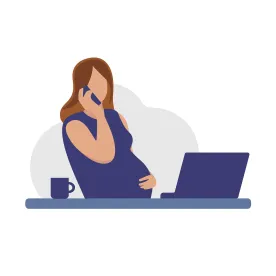Although the Pregnant Workers Fairness Act (“PWFA” or the “Act”) has been in effect since June 27, 2023, the Equal Employment Opportunity Commission (“EEOC” or the “Commission”) last week, published proposed rules regarding the enforcement of the Act. The PWFA has been covered in a previous blog post, but in short, the law requires employers to provide a reasonable accommodation for pregnant employees, regardless of whether that pregnancy has resulted in a disability as was the case under the Americans with Disabilities Act.
The proposed rules aim to clarify what accommodations employers could, or should, provide for pregnant employees. Specifically, the proposed regulations state in “virtually all cases” the following work modifications will be required to accommodate a pregnant employee: “(1) allowing an employee to carry water and drink, as needed, in the employee’s work area; (2) allowing an employee additional restroom breaks; (3) allowing an employee whose work requires standing to sit and whose work requires sitting to stand, and (4) allowing an employee breaks, as needed, to eat and drink.” In addition, the regulations explicitly distinguish the required level of “severity” of pregnancy-related “limitation” from that of “limitations” caused by disabilities under the ADA, stating that the “limitation may be a modest, minor, and/or episodic impediment or problem.” In this version of the rules, the bar to trigger an employer’s obligations to provide accommodations is less than what employers have traditionally been accustomed to for many years.
Perhaps most notably, the regulations provide a “non-exhaustive list” of examples of “pregnancy, childbirth, or related medical conditions” that require accommodation by employers, which now include a “current pregnancy, [a] past pregnancy, [a] potential pregnancy, lactation (including breastfeeding and pumping), use of birth control, menstruation, infertility and fertility treatments, endometriosis, miscarriage, stillbirth, or having or choosing not to have an abortion, among other conditions.” Under this definition, the potential conditions that could trigger PWFA coverage are broader than the previous “pregnancy-related” conditions under co-extensive statutes, such as the Family and Medical Leave Act.
While the public comment period for the proposed rule is set to close on October 10, 2023, the proposed rule has already received more than 6,000 comments as of the time of publishing. This high level of interest indicates that the rules will likely be revised before final rulemaking, but given the current makeup of the EEOC, employers should still expect an expansion of their compliance obligations to pregnant workers.





 />i
/>i

